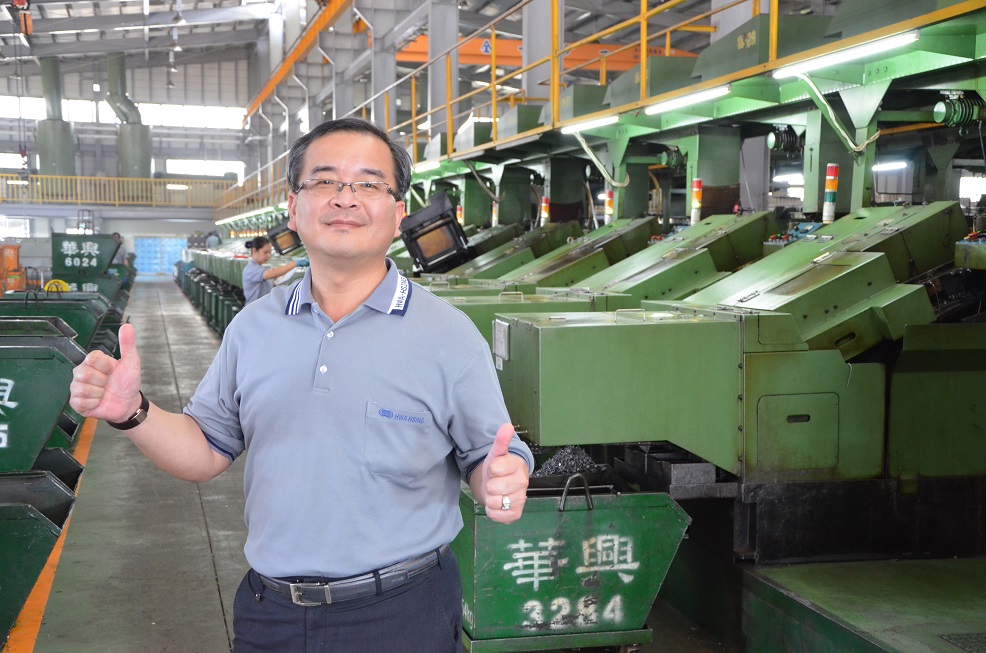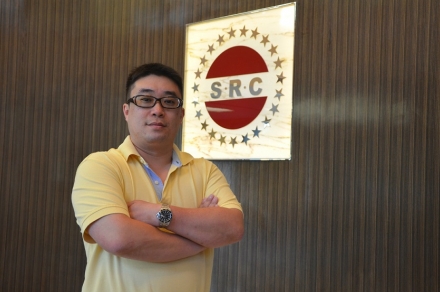
Industry Activities



How to Transfer Ownership Peacefully?
Hwa Hsing Screw President Jim C. N. Chen Turns out to be 2nd Generation, Too
by Tanya Shih, Fastener World Inc.
Established in 1973, Hwa Hsing Screw Industry Co., Ltd specializes in producing fasteners, particularly construction fasteners. It can work under OEM, ODM, co-development, or work as an agency. With professional technique and high-tech manufacturing equipment, the company provides clients with high quality products and service, sells 20 thousand tons of fasteners to the world market, and earns a monthly revenue of over NTD 100 million. It is a capable company with a sizable scale and is likely to go further by going public in the future. This is an incredible record in the history of Taiwanese fastener industry. The 3rd generation of the company is also working on the front line preparing for succession. As the 2nd-generation who went through transition peacefully, how will President Jim make of his successor plan?
Where did the 27-year-old Successor Get the Courage from?
When it comes to cultivating successors, some parents think they should keep the 2nd-generation around them, and others think the 2nd-generation should go outside and take challenges. Recalling 30 years ago when he graduated from senior high school, Jim said, “Come on! Nobody talked about succession at that time. Not to mention cultivating successors. I just hated school so I chose to work in a company as soon as I graduated in 1986.”
1986 Packer/operator of Hwa Hsing Screw Industry
1988 Military service
1991 Back to the company. In daytime, learning heading, threading, molding, wire transport on trucks, and office work (sales, finance, etc.). In the evening, studying international trade at a night school.
1994 The former president (his uncle) passed away, meanwhile, his father was in poor health.
1995 Completed formal succession.
Jim said, “In that year I was 27. I was the one who was forced to be the successor. At that time the company had around 20 people with a monthly capacity of 200-300 tons. The responsibility got to me all of a sudden, and in the short term it was not likely to put it away.” He asked himself, “Where does a 27-year-old successor like me get the courage from? Perhaps back then everything was preordained by God. Were it not for the company’s decade-long cultivation that offered me a chance to know the basics of the fastener industry, be involved in corporate management, and fill up the gap in managerial vacancy, you probably would not see today’s Hwa Hsing Screw Industry.”
In this regard, President Jim (the 2nd-generation successor) thinks there are 3 types of succession: (1) Compulsory succession when the 1st generation passes away; (2) The 2nd generation works together with the 1st generation; (3) The living 1st generation passes total ownership to the 2nd generation. Obviously, Jim belongs to the first type. He said, “This is the most lonely type but also the luckiest one. It is lonely because occasionally I would think of my uncle’s and dad’s era and imagine how they would deal with certain situations. The lucky part is that accordingly I do not have many obstacles out of concerns when making decisions.”
“Clashes were Certainly Inevitable. I Almost Though of Leaving for San Shing out of Anger.”
“Although in the first 10 years in Hwa Hsing Screw Industry I was not officially preparing for succession, basically I have been through the so-called adjustment period. Particularly after I studied international trade and got in touch with managers of various fields and visited other people’s factories, I became more intelligent and confident with my broadened horizon. Suddenly I realized my dad’s management were wrong in many ways.”
“Not to mention this era in which most of the 2nd generation are educated overseas and getting MBA. After returning to the homeland they realize their fathers’ companies lack management and systems and treat employees badly with terrible working conditions. If the fathers want their sons and daughters to take over, changes will have to be made. Big changes will result in one generation being loggerheads with the other generation. Therefore, many of the 2nd generation choose to start from scratch rather than taking over the family business.”
“Clashes are always motivated by the will to improve the company,” Jim said, “transcribing purchase orders was the first flaw that I wanted to change after I finished studying. At that time no one in the company could use a computer, no company in the traditional industry talked about computerization, so I felt that I had found my stage. Certainly I had faith that this was going to be a trend.” This decision was later proved to be correct, “but back then I had a huge argument with my dad, and in the afternoon I rode my scooter to the front gate of San Shing Corp and was almost ready for submitting my job application… What an impulse I had!”
From Taking Corporate Responsibility to Building a Company with Over NTD 100 Million Value
During the first years of succession, Jim (then less than 30 years of age) received teachings of technical production from assorted specialized predecessors, learned sales purchase orders from president Kosky Yen of Linkwell Industry, learned financial management from president James Su of Wellfly Enterprise, and learned ISO introduction from president Su-Kou Tsair of Taiwan Shan Yin and Simon Lin of Fong Prean. “Doesn’t it sound like I’m the Zhang Wuji in a Chinese writer Jin Yong’s Kong Fu novel?” Jim depicted himself and thanked for the teachings of his mentors. “This blessing that I have is attributed to the 1st generation that built the human connections that later become an intangible asset to the 2nd generation.”
“When I was with Dad, I had seen many factories going out of business,” he continued, “Seeing this much, one would come to understand why the companies went down. Don’t blame on the market or the price! The market is ever-changing. If others can simplify the manufacturing process and lower the cost, ask yourself why you couldn’t. Just figure out a way to do it.”
When did Jim start to feel like a successful business runner? Jim said, “Actually the 2nd generation is pathetic. If they take over and do well, the public will take it for granted. If they do not outstand, the public will say they perform fairly because they has pretty good foundation. If they do worse, the public will say the 2nd generation is a waste to the family. Succession is really not what it seems! For around 7 to 8 years after I took over, I couldn’t withstand others calling me president because I did not feel I was qualified to be called so. Others may think being a president is a big pride, but in fact it means immense responsibility and stress. The livelihood of 20 people under the same company depended on me. Everyone was wondering if I could sustain it.”
Therefore, Jim set for himself a target, “In the 25th anniversary I introduced ISO into the company, and it started to get on a normal track. Out of chances I acquired another company and made inroads into Dongguan of Guangdong Province as well as Anji of Zhejiang Province and set up plants there. I felt achievement when I set up plants there, I felt I could call myself a business runner.” Now the company has over 200 employees with monthly capacity at over NTD 100 million and stable growth.
“Peaceful Transition is Never a Piece of Cake. Stand in Others’ Shoes!”
Jim, starting to plan for the next succession, understands the importance of succession particularly because he once experienced it before. Thus, he has read a bunch of books on succession. “To make things clear, we are not just looking for ordinary succession, but for ‘peaceful’ succession.” Below Jim concludes on how to transfer ownership peacefully with his personal experience:
Let Go of your Social Position
The 1st generation often holds onto to ownership when cultivating the 2nd generation. No matter if it is the 1st or 2nd generation, in the company it is important to forget the fact that “You are my son” or “He is my dad” because the fact may hinder the succession.
Training Department by Department
Many of the 2nd generation started from the position of “special assistant” when they entered the company. This is feasible, but do not forget the importance of job shifts. Different companies naturally take different aspects seriously. It is like traders usually do not ask successors to be omni-potent but ask them to learn client service, etiquette in business, and financial concepts.
Do Not Make a Position Specifically for Someone
Taiwan is still used to choosing successors from inside the family. This is natural, but sometimes it is hard to make arrangement when the family grows large. Some companies prefer choosing the competent to choosing from inside the family, and likewise, they have to think how to make arrangement. I suggest that companies preparing for succession should not make a position specifically for someone. Maybe this will be the best way to achieve both recruitment of suitable talent and peaceful business running.
The 1st generation used to focus on domestic sales before. At that time there were not many competing companies, so product segmentation was bigger and gross margin was higher. Everyone was used to making new relationships if there was none. Relationships between companies were intimate and they were more willing to share business opportunities. The 2nd generation is in better business conditions thanks to contributions of the 1st generation. The contributions become the resources and backup for the 2nd generation. However, in the business environment of the 2nd generation, people are less likely to express greetings and the industry seems to do without business etiquette. It turns out as “whoever is stronger takes it all”.
Outsiders often see clearly while the participants are often lost in the maze. Jim said, in the following years many companies will start to face the problem of succession and I have met recently many of 2nd generation coming to ask me how to avoid argument. “I will tell them. Let’s suppose the fathers are always right. We are not overthrowing the business empire, but are scaling it up. Have this premise first and then try to persuade and negotiate!”

Subscribe











